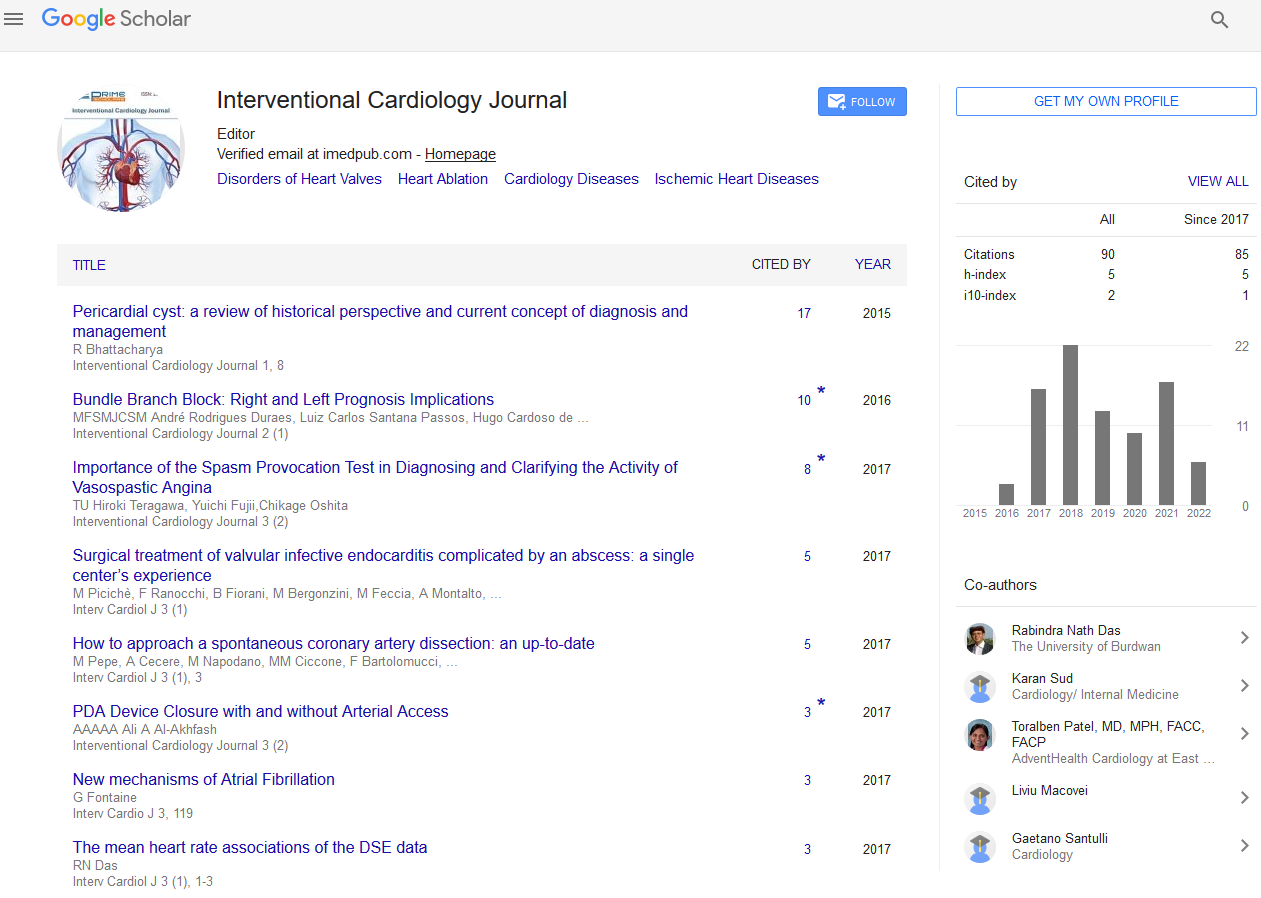Opinion - (2024) Volume 10, Issue 1
Unveiling the Complex Web of Cardiac Asthma: A Comprehensive Exploration
Rick Ford*
Department of Medicine, University of Rochester, USA
*Correspondence:
Rick Ford,
Department of Medicine, University of Rochester,
USA,
Email:
Received: 01-Jan-2024, Manuscript No. IPIC-23-18964;
Editor assigned: 03-Jan-2024, Pre QC No. IPIC-23-18964 (PQ);
Reviewed: 17-Jan-2024, QC No. IPIC-23-18964;
Revised: 22-Jan-2024, Manuscript No. IPIC-23-18964 (R);
Published:
29-Jan-2024, DOI: 10.21767/2471-8157.10.01.08
Introduction
Cardiac asthma, a term that may sound paradoxical, refers to a
condition where heart-related issues manifest with symptoms
resembling asthma. Despite sharing some common symptoms,
cardiac asthma and traditional bronchial asthma have distinct
origins, diagnostic criteria, and treatment approaches. This
article aims to provide an in-depth understanding of cardiac
asthma, exploring its pathophysiology, clinical presentation,
differential diagnosis, diagnostic methods, and appropriate
management strategies. Cardiac asthma is a term used to describe
a set of respiratory symptoms that result from Congestive
Heart Failure (CHF) or other cardiac conditions. It is essential to
differentiate cardiac asthma from bronchial asthma, a chronic
inflammatory disorder of the airways. While both conditions
may present with wheezing and shortness of breath, their origins
and underlying mechanisms are distinct. The pathophysiology
of cardiac asthma revolves around the impaired function
of the heart, leading to increased pressure in the pulmonary
circulation. This elevated pressure, often due to left heart failure,
results in fluid accumulation in the lungs, causing airway
constriction and respiratory symptoms. The symptoms of cardiac
asthma often mimic those of bronchial asthma, making
diagnosis challenging without a thorough evaluation. Wheezing,
shortness of breath, coughing, and chest tightness are
common features shared between the two conditions. Despite
the similarities, certain features can help differentiate cardiac
asthma from bronchial asthma.
Description
Cardiac asthma must be differentiated from various conditions
that may present with similar respiratory symptoms. These include
Chronic Obstructive Pulmonary Disease (COPD), pulmonary
embolism, pneumonia, and other respiratory or cardiac
disorders. Thorough clinical evaluation, imaging studies, and
laboratory tests are crucial for an accurate diagnosis. The diagnosis
of cardiac asthma begins with a detailed clinical evaluation,
including a thorough medical history, physical examination,
and assessment of symptoms. Identifying risk factors for
heart failure, such as hypertension, coronary artery disease,
or valvular disorders, aids in narrowing down the potential
causes. Imaging studies play a crucial role in diagnosing cardiac
asthma. Chest X-rays can reveal signs of pulmonary congestion,
such as Kerley B lines, peribronchial cuffing, and an
enlarged cardiac silhouette. Echocardiography is instrumental
in assessing cardiac function and identifying underlying heart
conditions contributing to pulmonary congestion. Pulmonary
function tests, including spirometry and peak flow measurements,
may be performed to assess lung function. While these
tests may show obstructive patterns, they do not distinguish
cardiac asthma from bronchial asthma definitively. Elevated
levels of BNP, a hormone released by the heart in response to
increased cardiac stress, can support the diagnosis of cardiac
asthma. BNP levels are commonly measured in blood samples
and serve as a marker of heart failure severity.
Conclusion
Cardiac asthma, while sharing symptoms with bronchial asthma,
is a distinct condition rooted in cardiac dysfunction. A
thorough clinical evaluation, supported by imaging studies and
laboratory tests, is crucial for accurate diagnosis and appropriate
management. Addressing the underlying cardiac conditions
through a multidisciplinary approach is paramount in alleviating
symptoms and improving the long-term outcomes of individuals
with cardiac asthma. Ongoing research and advancements
in diagnostic methods and therapeutic strategies hold
promise for further improving the understanding and management
of this intricate cardiovascular-respiratory interaction.
Research in the field of cardiac asthma continues to explore
novel diagnostic tools and therapeutic approaches.
Citation: Ford R (2024) Unveiling the Complex Web of Cardiac Asthma: A Comprehensive Exploration. Interv Cardiol J. 10:08.
Copyright: © 2024 Ford R. This is an open-access article distributed under the terms of the Creative Commons Attribution License, which permits unrestricted use, distribution, and reproduction in any medium, provided the original author and source are credited.

